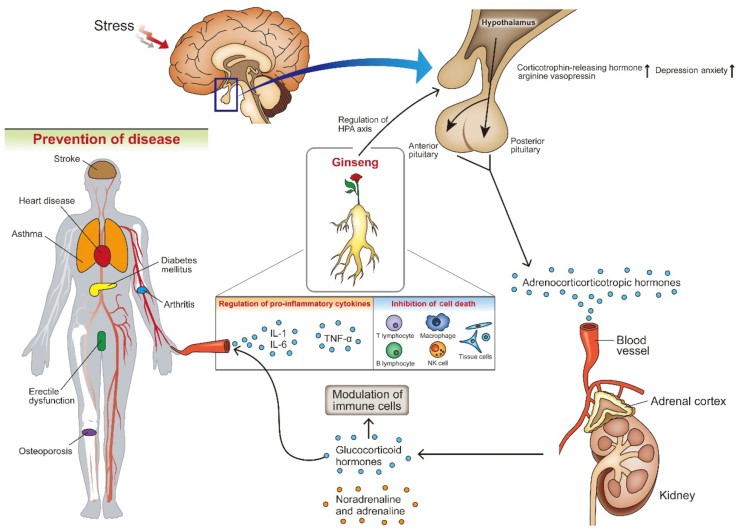GINSENG – “SPECIAL” HERBAL MEDICINE FOR FATIGUE PEOPLE
When mentioning about traditional medicines, it is impossible to not mention the Four Great Medicines “Sam – Nhung – Que – Phu”. The concept of the Four Great Medicines has been mentioned in ancient books on medicinal herbs such as Than Nong Manuscripts……..” Sam – Nhung – Que – Phu”, here are the medicinal herbs: Ginseng, Velvet Antler, Cinnamon, and the Root of Aconitum.(1).
The same thing of these medicinal herbs is that they are rich in active substances, which help to replenish the vital energy and bring many health benefits.(1)
As the top of the 4 premium medicines of Eastern medicine, Ginseng helps to replenish vital energy for people with weakness, reduce fatigue, reduce nervous tension, increase energy, increase resistance. Especially, the root of ginseng is very effective in regulating blood pressure.(2)
Ginseng is a plant that grows wild or is grown in high, low temperature, cool areas, also known by other names such as ginseng pill, wild ginseng, kaolin ginseng, Korean ginseng. The scientific name is Panax ginseng C. A. Mey Araliaceae.(2,3)
The part used as medicine is the root (Radix Panacis) from 4-6 years old. It can be used fresh or dried. The way to get White Ginseng is to dig the root, wash the sandy soil, blanch in boiling water, cut off the roots and remove the outer skin, and dry. The good roots can be processed into Red Ginseng by steaming and then drying.(3)
The chemical components of Ginseng are saponins (mainly ginsenosides), polysaccharides, essential oils, polyacetylene compounds, gintonin….(3) Ginseng’s main ginsenosides are G-Rg1 and Rb1 which provide many health benefits (3).
The proven effects of Ginseng include:
1/ Reduce fatigue, replenish vital energy
According to oriental medicine, Ginseng is a great tonic for the qi, beneficial for the spleen, lungs, and heart. Ginseng has a neutral, sweet, slightly bitter taste that has the effect of tonic, pain relief and anti-fatigue.(2)
Many clinical studies have proven that Ginseng is an effective herb for reducing fatigue, nourishing the body, increasing energy through antioxidant effects, regulating carbohydrate metabolism, and inhibiting the accumulation of metabolites, promoting of mitochondrial function, neuro-protecting and correcting of neurotransmission disorders. The main active ingredient ginsenoside helps to improve skeletal muscle energy metabolism, increase ATP content and enhance the activity of energy metabolism enzymes.(4,5,6)
2/ Protect nerves, reduce nervous tension
Many studies have shown that Ginseng has neuroprotective properties, improves memory, cognitive ability and inhibits neurodegeneration (such as Alzheimer’s disease, Parkinson’s disease …). Active ginsenosides Rb1 and Rg1 play an important role in producing this effect.(7)
Ginseng can help us stay mentally alert, change our moods, and reduce fatigue. When a person is experiencing extreme stress, the adrenal hormones (cortisol, adrenaline and noradrenaline) increase and cause a variety of health problems. Ginseng helps regulate the hypothalamus-pituitary-adrenal axis effectively.(8)
In a test on rats, Ginseng was compared with Ginkgo in reducing nervous tension. (Ginkgo is a famous herb that is good for the brain to help increase blood circulation in the brain.) The results show that Ginkgo is effective in acute stress, but with chronic stress, Ginseng is a better choice. Thus, the combination of Ginseng with Ginkgo shows a clear effect in improving acute and chronic stress.(9)
3/ Stimulate immune system
Ginseng’s effect is to enhance the body’s immunity through the regulation of each type of immune cells including macrophages, T cells, B cells and natural killer cells and dendritic cells. Since then, Ginseng helps maintain homeostasis of the immune system and strengthens the body’s innate immune system against diseases caused by the attack of bacteria, viruses and other infectious diseases.(10)
4/ Hypoglycemia
Ginseng significantly reduces blood sugar, increases serum insulin levels, and improves glucose metabolism. Ginseng is considered an effective herb to control blood sugar in diabetic patients.(11)
5/ Prevent cancer
The growth of certain types of cancer cells is potentially inhibited by ginseng. According to a study that aggregated data involving 7.436 cases and 334.544 participants, the risk of developing cancer was significantly lower by 16% in patients taking ginseng. The ginsenosides presented in ginseng have anti-tumor effects by inhibiting cell cycle progression and slowing the growth of cancer cells and so, Ginseng may cause damage to cancer cells.(12,13)
Some notes when using ginseng(14)
Ginseng enhances the activity of the circulatory and respiratory systems, increases nervous excitement, increases energy, increases working capacity… Therefore, the best using way for better rest is in the morning or afternoon, not in the evening. Ginseng should not be taken with radishes, coffee, tea and other psychostimulants that reduce the effects of ginseng.
Caution when using ginseng(2)
Ginseng is the tonic, but it cannot be used for everyone. Some groups of people cannot use ginseng such as:
- People who often have flatulence, abdominal distension, tightness, abdominal pain, abdominal bloating, broken stools, loose or diarrhea should not be used.
- People with vomiting, acid reflux, and high blood pressure should not use it.
- Women before giving birth should also not use ginseng.
- People who often lose sleep but have weak resistance and want to use ginseng should use it in the morning with a low dose, about 2-3g/day. It should be noted not to use ginseng (or ginseng root knob), because it has the effect of causing vomiting.
- Children with weak health, poor appetite, slow physical and mental development can use ginseng, but should not be abused because it will put children at risk of early sexual stimulation.
With many health benefits, ginseng is used quite commonly: directly fresh ginseng or white ginseng or red ginseng, or in the form of tea, drinking water, tablets, soft capsules … and used alone or in combination with other herbs to enhance the effect of each other.
Currently, there is a unique combination of Ginseng with other herbs such as Ginkgo (a ” gold” herbal for the brain increasing blood circulation in the brain), Blueberry (“king” fruit for anti-oxidant and anti-aging effects), and Omega 3 (DHA and EPA – support to improve blood cholesterol), and Vitamins and minerals (for immunity and cellular metabolism) in appropriate doses and in convenient packaging: soft capsules ….for daily to help to support fatigue, weakness, cerebral ischemia, increase energy, increase alertness….
Patients should search product information carefully, choose products from reputable pharmaceutical manufacturing companies have experienced in producing products with high quality standards.
References:
1. https://tracuuduoclieu.vn/sam-nhung-que-phu-tu-dai-danh-duoc-trong-dong-y.html
2. https://www.vinmec.com/vi/y-hoc-co-truyen/duoc-lieu/tac-dung-cua-nhan-sam-voi-suc-khoe/
3. https://mplant.ump.edu.vn/index.php/nhan-sam-panax-ginseng-araliaceae/
4. Noël M. Arring, Denise Millstine, Lisa A. Marks and Lillian M. Nail, Ginseng as a Treatment for Fatigue: A Systematic Review, The Journal of Alternative and Complementary Medicine, 24(2018), pp 624-633
5. Shan-Jun Tan , Ning Li , Feng Zhou , Qian-Tong Dong , Xiao-Dong Zhang , Bi-Cheng Chen , Zhen Yu , Ginsenoside Rb1 improves energy metabolism in the skeletal muscle of an animal model of postoperative fatigue syndrome, J Surg Res, 191(2014), pp 344-349
6. Ting-Yu Jin, Pei-Qing Rong, Hai-Yong Liang, Pei-Pei Zhang, Guo-Qing Zheng* and Yan Lin*, Clinical and Preclinical Systematic Review of Panax ginseng C. A. Mey and Its Compounds for Fatigue, Front. Pharmacol, Sec. Ethnopharmacology (2020)
7. Natasya Trivena Rokot, 1 Timothy Sean Kairupan, 1 , 2 Kai-Chun Cheng, 1 Joshua Runtuwene, 1 , 2 Nova Hellen Kapantow, 2 Marie Amitani, 1 Akinori Morinaga, 1 Haruka Amitani, 1 Akihiro Asakawa, 1 and Akio Inui 1 , A Role of Ginseng and Its Constituents in the Treatment of Central Nervous System Disorders, Evid Based Complement Alternat Med (2016)
8. Seungyeop Lee and Dong-Kwon Rhee∗, Effects of ginseng on stress-related depression, anxiety, and the hypothalamic–pituitary–adrenal axis, J Ginseng Res, 41(2017), pp 589–594.
9. Deepak Rai1 , Gitika Bhatia2 , Tuhinadri Sen3 , and Gautam Palit1,*, Anti-stress Effects of Ginkgo biloba and Panax ginseng: a Comparative Study, J Pharmacol Sci 93 (2003), pp 458 – 464.
10. Soowon Kang and Hyeyoung Min*, Ginseng, the ‘Immunity Boost’: The Effects of Panax ginseng on Immune System, J Ginseng Res, 36(2012), pp 354–368.
11. Vladimir Vuksan 1, Mi-Kyung Sung, John L Sievenpiper, P Mark Stavro, Alexandra L Jenkins, Marco Di Buono, Kwang-Seung Lee, Lawrence A Leiter, Ki Yeul Nam, John T Arnason, Melody Choi, Asima Naeem, Korean red ginseng (Panax ginseng) improves glucose and insulin regulation in well-controlled, type 2 diabetes: results of a randomized, double-blind, placebo-controlled study of efficacy and safety, Nutr Metab Cardiovasc Dis, 18 ( 2008), pp 46-56.
12. Xin Jin, Dao-biao Che, Zhen-hai Zhang, Hong-mei Yan, Zeng-yong Jia, and Xiao-bin Jia, Ginseng consumption and risk of cancer: A meta-analysis, J Ginseng Res. 40(2016), pp 269–277.
13. Chong-Zhi Wang, Samantha Anderson , Wei DU, Tong-Chuan He, Chun-Su Yuan, Red ginseng and cancer treatment, Chin J Nat Med, 14(2016), pp 7-16.
14. https://suckhoedoisong.vn/nhan-sam-vi-thuoc-bo-nhung-khong-phai-ai-cung-dung-duoc-169220823101805659.htm
- 1. THE EXPERT’S SHARING: THE KEY TO START A NEW DAY FULL OF ENERGY
- 2. THE ROLE OF HERBAL IN INCREASING PHYSICAL & MENTAL HEALTH
- 3. TIPS FOR CHOOSING AUTHENTIC AND HIGH QUALITY CORDYCEPS SUPPLEMENTS
- 4. LIST OF 3 EFFECTIVE BRAIN SUPPLEMENT HERBALS
- 5. FATIGUE – WARNING SIGNS OF CHRONIC FATIGUE SYNDROM, YOU SHOULD KNOW?
- 6. ADVICE FROM THE PROFESSIONAL ABOUT “STRENGTHEN RESISTANCE IN THE TIME OF COVID”

